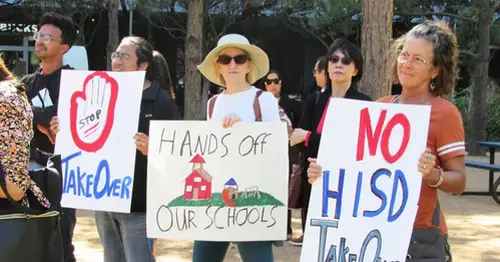
Texas has taken over the Houston school district. Educational outcomes have not always improved in other states that have done so.
Texas this week announced a state takeover of the Houston public school district, the state’s largest and the eighth-largest in the country, a controversial move that will replace its democratically elected school board and superintendent with a board of managers appointed by the Texas Education Agency.
While the announcement leaves many unanswered questions about what the takeover will mean for the district’s roughly 200,000 students, education experts told NBC News that research on previous district takeovers has shown no significant gains in student performance, and even some declines.
“We find no evidence that on average that takeovers improve academic achievement and found evidence that it can be kind of disruptive on average in the early years,” said Beth Schueler, an assistant professor of education and public policy at the University of Virginia.
Texas lawmakers react to takeover of Houston public schools
March 15, 202301:42In a research paper published last year, she examined nearly three dozen state takeovers of school districts around the country from 2011 to 2016 and looked at the impact on student academic achievement, including through English language arts and math test scores.
Researchers said in the paper that on average, “we find no strong evidence that takeover produces benefits for student academic achievement in ELA or math, at least in the short run, and evidence that it is typically disruptive for student ELA achievement in the early years of takeover.”
The study also found that in both subjects, “the negative effects of takeover were larger in districts with higher baseline test scores.”
The research also showed that districts that served larger populations of Black students were more likely to be the target of a takeover, regardless of academic performance.
Schueler said that while the research showed that on average these takeovers were not beneficial to student achievement, there is a range among districts where some have seen positive effects while others have seen negative and harmful effects.
Texas first launched its plan to take over the Houston school district in 2019, after allegations of misconduct by school trustees and consecutive years of low academic scores at Phillis Wheatley High School.
Republican Gov. Greg Abbott’s education commissioner said in a letter to the school board and superintendent Wednesday that the board of managers was being appointed because one of the district’s campuses “received unacceptable academic accountability ratings for five consecutive years.” Mike Morath said another reason was because the district has had a conservator assigned for more than two consecutive years.
“Texas law authorizes the appointment of a Board of Managers based on the district’s inability to improve student achievement at its low-performing campuses,” he wrote.
Critics of the takeover say the district has made improvements since 2019 and question if the move is politically motivated against local Democratic control in a Republican-controlled state.
U.S. Rep. Sheila Jackson Lee, D-Texas, has asked the federal government to interfere in the takeover, calling it “discriminatory.” A majority of the students in the Houston district are Black or Hispanic.
Jonathan Supovitz, a professor of leadership and policy at the University of Pennsylvania’s Graduate School of Education, said that in the case of individual districts, there is “evidence that cuts in both directions on the question of whether state takeover can improve student learning.”
One example of a positive impact was after Massachusetts took over the Lawrence school district in 2011. Researchers “found substantial gains in math and modest gains in reading over two years” in the small district with about two dozen schools, he said.
Supovitz cited the controversial takeover of the New Orleans school system after Hurricane Katrina in 2005 as a successful case. The local school district, still under state control, operates as a series of charter schools.
Tulane University researchers found in 2018 that in the nine years following Katrina, student achievement increased by 11 to 16 percentiles, the high school graduation rate rose by 3 to 9 percentage points and college entry and graduation rates also climbed.
They noted it was “very unusual to see programs and policies improve all of these outcomes.”
But other research points to failures in that all-charter school system, with a 2015 policy brief from researchers with the Stanford Center for Opportunity Policy in Education finding that the "quality of schools is highly variable" and "highly stratified by race, class, and educational advantage, operating in a hierarchy that provides very different types of schools serving different 'types' of children."
A bill that sought to return the charter schools under the state's control to the local school board failed in a state Senate vote in May.
Supovitz said other examples of school takeovers have been less successful, including in 2002 when Pennsylvania took over the school district of Philadelphia and approved a range of for-profit and nonprofit providers to run a set of its schools. Research from the Rand Corp. in 2007 found that on average, “schools managed by private providers were doing neither better nor worse at raising student achievement than were schools in the rest of the district, in math and reading, in each of the first four years of private management.”
But the group of schools that were restructured under district management “showed larger achievement improvements by their students in mathematics in each of the three years during which the restructuring intervention was in place” and when it came to reading, “a significant achievement advantage over the rest of the district only in the first year of the intervention.”
Supovitz said that in another example, 52 schools were forced to restructure by Ohio in 2008 because of persistent issues. But after several years of reform efforts, fewer than 1 in 3 of the schools reached academic goals, and fewer than half of them showed any student performance gains, he said.
Schueler said the size of the Houston school district makes the most recent takeover a bit more unique because over time, the average district that’s been taken over has become smaller.
She said the big picture questions that remain to be seen are, what will Texas do with the authority over Houston schools, what kinds of reforms will be implemented and what sort of exit strategy will be planned.







